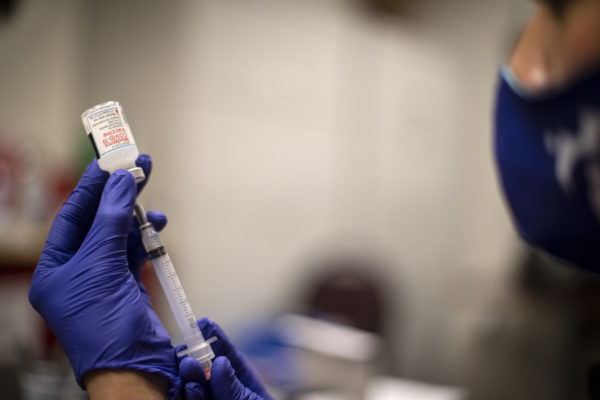
Pacific Islanders and Native Hawaiians have been the racial group hardest-hit by the COVID-19 pandemic in Alaska. But state data also shows they’re the least likely to be vaccinated.
Just 143 Alaskans who identify as Pacific Islander or Native Hawaiian had been vaccinated out of 84,000 Alaskans as of Wednesday, according to the state’s vaccination dashboard.
That means Islanders are about 10 times less likely to be vaccinated than the general population. But the most recent state data on mortality shows Pacific Islanders and Native Hawaiians are 10 times more likely to die of COVID-19.
Nurse Judy Tanuvasa, who is Samoan, said she feels the community has been overlooked by state officials.
“I’m looking at our people and they have no access at all,” she said.
She’s an active community leader and her husband leads several Samoan churches. But she said she can count the number of Islanders she knows who have been vaccinated on one hand.
“I only know maybe four people that already got vaccinated,” she said. “It’s sad.”
Health officials say they’re working to correct the inequity, but putting the pieces together is complex.
Language is one factor. Some Islanders don’t speak English as a first language, especially seniors who are currently eligible for vaccine.
Tanuvasa said she had to help her 72- and 73-year-old parents navigate the state’s vaccination website. It was hard, even for her.
“It’s really confusing and discouraging,” she said.

By the time she figured it out, appointments were booked through April.
The website doesn’t offer translated information. To get the message out takes time and money.
“It’s not just the Samoan language — there’s Tongan language, and then there’s Hawaiian, and then there’s Fijian, there’s Palau — there’s so many of Pacific Islanders here,” said Lucy Hansen, president of the Polynesian Association of Alaska.
Her group has been working to translate materials, but she’s operating on a volunteer basis. With several adopted children at home, she said she’s juggling a lot.
Without an organization in charge of Islander health, directing resources is challenging for both health officials and community members.
Tanuvasa, who has given dozens of vaccines to patients in the course of her work at the Alaska Native Medical Center, said she sees firsthand the difference having healthcare infrastructure designed for a group of people can have.
Alaska Natives also had high rates of death and hospitalization from COVID-19. But in contrast to Islanders, Natives have a vast infrastructure in place through the tribal health system. Their efforts have been lauded for quickly getting vaccine into thousands of arms.
“It’s like, ‘Whoa, this is amazing how they reach out and bring people to get immunized,’” said Tanuvasa. “I am hoping that they can come up with something like that [for us].”
Without a specific healthcare organization, the Polynesian Association and a loose network of church and community leaders have taken on public health efforts for Islanders. In a normal year, the Polynesian Association would be focused on organizing dance performances and pancake fundraisers. Now, it’s translating materials, producing public health messages and countering misinformation about vaccines.
There’s no good data about whether anti-vaccination beliefs could be affecting vaccination rates in the community. National public opinion polling shows some minority groups are less likely to think the vaccine is safe.
An Alaska poll on COVID-19 attitudes conducted in November didn’t break down attitudes about the vaccine by race. Getting meaningful data about Islander attitudes would require a specific effort because of the relatively small size of the population, said Matt Larkin, a pollster involved with the survey.
Tanuvasa said that anecdotally, she thinks there is pervasive misinformation about vaccines circulating on social media within the Islander community.
“I saw there were things that say, ‘Oh, so and so received their shot and ended up, you know, dead.’ So they’re getting mixed mix information,” she said.
Anchorage Health Director Heather Harris said there are ongoing efforts to correct for inequities health officials have seen in the data.
A move by the state last week would give the city more control over how the vaccine is allocated within the municipality, which will allow it to address racial inequity, Harris said.
The city will convene its own vaccine allocation committee to help come up with ways to make sure the vaccine gets out to underserved communities, she said.
The new committee will work within the state’s allocation guidelines, “but also really bring in that ethics piece to trying to promote justice and mitigate health inequities,” Harris said.
Hansen said one obstacle will be geography. There are currently few clinics with vaccine doses in the areas where many Islanders live, such as Mountain View and East Anchorage, and many people don’t have their own cars.
Harris said officials are planning mobile clinics to be more accessible.
“We’re calling them Strike Teams that might administer that vaccine to specific locations,” she said.
It’s a model that was used successfully when the city brought COVID-19 tests to community churches in East Anchorage last fall.
But it’s all contingent on having more vaccine, which so far has been in short supply.
The Link LonkJanuary 29, 2021 at 11:58PM
https://www.alaskapublic.org/2021/01/29/alaskas-pacific-islanders-are-being-hit-hard-by-covid-19-but-they-arent-getting-vaccinated/
Alaska's Pacific Islanders are being hit hard by COVID-19. But they aren't getting vaccinated. - Alaska Public Media News
https://news.google.com/search?q=hard&hl=en-US&gl=US&ceid=US:en
No comments:
Post a Comment